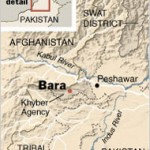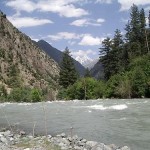Related Post: Mr Obama’s War - US Special Forces Training Pakistani Units, US Military Pressing Pakistani AlliesRelated Post: Mr Obama’s War - Ceasefire in NW Pakistan; More on US Drone StrikesRelated Post: Mr Obama’s War - Expanding the Enemies in Pakistan I was trying to write a full analysis, based on our revelations of US political and mililtary activity in Pakistan over the last week, when Josh Mull, a.k.a. "UJ", posted this comment on yesterday's entry "Mr Obama’s War: Expanding the Enemies in Pakistan".The comment rightly corrects me on several points but, more importantly, I think it offers the answers I was seeking: "What we are witnessing is a long-term, wide-ranging strategy of creating international legitimacy and political credibility for an escalation of violence by the US, Pakistan, and NATO against religious and tribal insurgents in Afghanistan and Pakistan."
I was trying to write a full analysis, based on our revelations of US political and mililtary activity in Pakistan over the last week, when Josh Mull, a.k.a. "UJ", posted this comment on yesterday's entry "Mr Obama’s War: Expanding the Enemies in Pakistan".The comment rightly corrects me on several points but, more importantly, I think it offers the answers I was seeking: "What we are witnessing is a long-term, wide-ranging strategy of creating international legitimacy and political credibility for an escalation of violence by the US, Pakistan, and NATO against religious and tribal insurgents in Afghanistan and Pakistan."Excellent analysis but…come on now…Obama is “happy” to expand the war in Pakistan? How could you possibly know something like that? Maybe he was outraged or furious to expand the war.
I agree with you that “the media” does often misuse the term “Taliban” but US Military literature as well as relevant trade/industry publications are quite specific about the differences between Big T Taliban, that is the Afghan Mullah Omar-led insurgency and al-Qa’eda militants, and little t taliban, or the Pakistani (Sirajuddin Haqqani, Baitullah Mehsud, etc.) insurgency and tribal militants. As long as we’re picking at the mainstream press, they also like to lump in everyone from Jundallah (Iranian People's Resistance Movement) to the Baloch National Democratic Party as “Taliban,” so really, what are we hoping for from them?
You said: “Thus it is unclear whether the US strategy co-exists with Islamabad’s effort, reaching accommodations with some local groups while striking at others, or whether it is in direct conflict with an effort to defuse tensions with insurgents.”
The synergy of these two strategies becomes a bit more clear with the inclusion of more data.
For instance, describing one strategy as “Islamabad’s effort, reaching accommodations with some local groups while striking at others” is a bit misleading. For one thing, the specific machinations of “Islamabad” have to be made apparent. The Pakistani Military is in charge, and it uses the popularly elected civilian government as a credible tool for diplomatic negotiations with insurgent/militant factions throughout Afghanistan, Iran, Pakistan, Bangladesh, Kashmir, and India. This alone tells us that the strategy is much broader in scope than simply Afghanistan, or even the Global War on Terror, but it also helps clarify the second part of the statement, “reaching accommodations with some local groups while striking at others.”
Since we’re clear that the entire Pakistani National Security strategy is based on relations with “some” militants and hostility to “others,” let’s focus exclusively on Pakistan’s small t taliban. Since 2002, the Pakistani government has been striking deals with the militants. Each time, the violence increases, and the US and Pakistani military are forced to crack down. What’s absent from your analysis is that each time the US and Pakistani military crack down, including the recent drone strikes against Mehsud ordered by President Obama, they come with much more international credibility and political legitimacy.
Domestically, the Pakistani military was seen as brutal and thuggish bullies for invading the tribal areas unilaterally. Once they cooperated with the insurgents, and the Pakistani civilian population was rewarded with bloody kidnappings and suicide bombings, public demand for a violent crack down was solidified. The international community is also given a stark moral choice: live with the human rights black hole of Sharia Law or provide more support to the effort to quash the insurgency. Even President Obama was able to openly campaign on promises of increased violence against Pakistani insurgents on the foundation of failed Pakistani government truces and increased Afghan attacks, and he was rewarded with a 9+ million vote mandate from the American electorate.
Thus we have an answer to your final question, whether or not these strategies are “in direct conflict with an effort to defuse tensions with insurgents.” The answer is yes, these strategies are directly opposed to any effort to “defuse tensions with insurgents,” and for that matter, it has never been the stated goal of anyone relevant to the conflict to defuse tensions with the militants. Instead, what we are witnessing is a long-term, wide-ranging strategy of creating international legitimacy and political credibility for an escalation of violence by the US, Pakistan, and NATO against religious and tribal insurgents in Afghanistan and Pakistan.
 Monday, February 23, 2009 at 15:47
Monday, February 23, 2009 at 15:47  The Asia Times reports, in the aftermath of the local cease-fire between the Pakistani Governments and groups in the Northwest Frontier Provice:
The Asia Times reports, in the aftermath of the local cease-fire between the Pakistani Governments and groups in the Northwest Frontier Provice:
 I was trying to write a full analysis, based on our revelations of US political and mililtary activity in Pakistan over the last week, when Josh Mull, a.k.a. "UJ", posted this comment on yesterday's entry
I was trying to write a full analysis, based on our revelations of US political and mililtary activity in Pakistan over the last week, when Josh Mull, a.k.a. "UJ", posted this comment on yesterday's entry 


